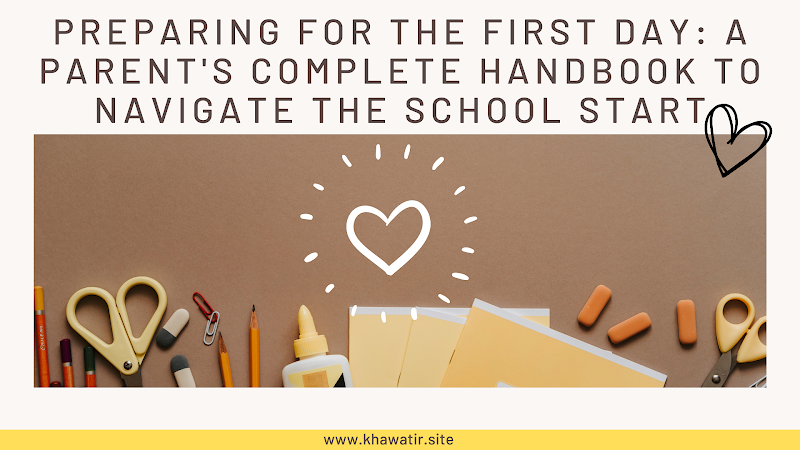First Day of School A Comprehensive Guide for Parents on Managing This New Experience
The first day of school for a child is a momentous occasion, not just for the child but also for the parents. It marks the beginning of a significant chapter in the child's life, filled with anticipation, excitement, and perhaps a touch of apprehension. In this article, we'll delve into how parents can best prepare their children for this milestone and offer support and guidance to navigate through this new phase.
1. Mental and Emotional Preparation:Before the big day arrives, parents play a crucial role in mentally and emotionally preparing their child for school. This involves having open and honest conversations about what to expect, addressing any fears or concerns the child may have, and emphasizing the positive aspects of starting school, such as making new friends and learning new things. Parents can also share their own positive experiences of school to reassure the child.
Furthermore, parents can engage their child in activities that promote emotional readiness for school. Reading books about starting school, role-playing school scenarios at home, and visiting places where children congregate, such as playgrounds or libraries, can help familiarize the child with the idea of being around other children and adults in a structured setting.
2. Familiarization with the School Environment:To ease any anxiety the child may feel about starting school, it can be helpful to arrange a visit to the school beforehand. During this visit, parents and children can explore the school grounds, visit the classroom, meet the teacher, and familiarize themselves with important areas such as the cafeteria, restroom, and playground. This firsthand experience can help alleviate any fears and make the transition smoother.
In addition to visiting the school, parents can create a visual schedule or timeline of the first day of school to help the child understand what to expect. This can include waking up, having breakfast, getting dressed, traveling to school, and the various activities that will take place throughout the day. Having a clear outline of the day's events can provide reassurance to the child and help alleviate any anxiety they may feel about the unknown.
3. Establishing Independence:Encouraging independence is essential for a child's development, and starting school provides an excellent opportunity to promote this trait. Parents can involve their child in tasks such as packing their school bag, choosing their outfit for the day, and preparing their lunch. This not only instills a sense of responsibility in the child but also boosts their confidence in their abilities.
Moreover, parents can empower their child by teaching them essential skills for navigating the school environment independently. This may include knowing their full name and contact information, understanding basic safety rules such as looking both ways before crossing the street, and practicing social skills such as introducing themselves to new classmates and asking for help when needed.
4. Communication and Connection:Maintaining open lines of communication between parents and the school is key to supporting the child's transition to school. Parents should attend orientation sessions, parent-teacher meetings, and other school events to stay informed about their child's progress and any upcoming activities or changes. Building a positive relationship with the child's teacher can also facilitate effective communication and collaboration.
In addition to formal communication channels, parents can establish informal connections with other parents in the school community. Joining parent-teacher associations, attending school events, and participating in volunteer opportunities can help parents feel more connected to the school community and provide valuable support networks for both parents and children.
5. Reassurance and Support:On the morning of the first day of school, it's normal for both children and parents to experience a mix of emotions. Parents can offer reassurance and support by being present, listening to any concerns the child may have, and offering words of encouragement. Remind the child that it's okay to feel nervous and that they're not alone – their parents and teachers are there to help them every step of the way.
Additionally, parents can prepare a special treat or surprise for their child to look forward to after their first day of school. Whether it's a favorite snack waiting at home, a small gift, or a fun activity planned for the evening, having something to anticipate can help ease any anxiety and make the transition more positive for the child.
6. Celebrating Milestones:After the first day of school is over, take the time to celebrate this significant milestone with your child. Acknowledge their courage and resilience in facing a new experience, and praise them for any accomplishments, big or small. This celebration reinforces their confidence and sets a positive tone for the rest of the school year.
Furthermore, parents can create a special memory book or scrapbook documenting the child's first day of school. Include photos, drawings, and written reflections from the child about their thoughts and feelings on starting school. This keepsake not only preserves cherished memories but also serves as a reminder of the child's growth and progress throughout their academic journey.
Conclusion:The first day of school is a memorable milestone in a child's life, and with the right preparation and support from parents, it can be a positive and empowering experience. By addressing any concerns, fostering independence, maintaining communication with the school, and offering reassurance and encouragement, parents can help their child navigate the transition to school with confidence and enthusiasm.










